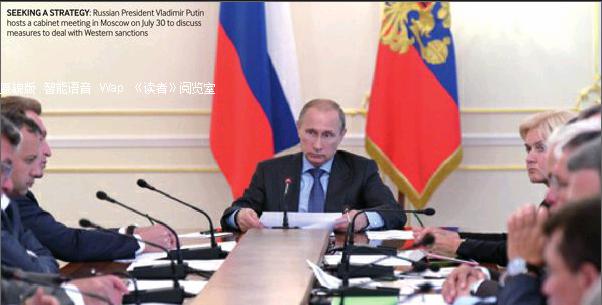Costly Sanctions
2014-09-15ByBaiShi
By+Bai+Shi

Since the Malaysia Airlines flight MH17 was brought down in east Ukraine on July 17 killing all 298 people on board, Russia has faced a new wave of tough sanctions pushed for by the United States and its allies.
On July 29, the EU announced to impose a package of additional restrictive measures on Russias finance, defense and energy sectors, effective as of august 1. U.S. President Barack Obama then unveiled new penalties on Russia. Following the EU and the United States, Canada and Japan also imposed sanctions against Russia.
This round of sanctions is much broader and tougher than previous measures since the West first decided to tighten economic clamps on Russia on March 17 due to Moscows support for the Black Sea Crimean Peninsulas split from Ukraine. They represent “a strong warning” and “a powerful signal” to Russia that “destabilizing Ukraine or any other neighboring East European country will bring heavy costs to its economy,” said a European Council statement.
at present, Western sanctions have expanded to 95 Russian individuals and 23 companies from energy, defense and finance sectors, including Russian oil giant Rosneft, its second largest natural gas company Novatek, and major banks such as Gazprombank and Russias state-owned development lender vEB.
Mutually painful sanctions
The Russian economy is mainly resource-based and the new sanctions hit its key areas, said Feng yujun, Director of the Institute of Russian Studies under the Beijing-based China Institutes of Contemporary International Relations.
During the Cold War, the Soviet Union and its East European allies in the Council for Mutual Economic assistance were able to maintain a separate market from the West. But in the mod- ern era, the global economy has been bonded together to such a degree that the Russian economy will inevitably be impacted by such sanctioning, Feng said.
Russia is the worlds largest natural gas exporter and its second largest oil exporter. The West is imposing restrictive measures on Russias energy products, which account for 70 percent of the nations total exports, and will limit its access to capital markets and acquisition of technologies for oil and gas exploration. The United States and EU have also banned trade in arms with Russia, further restraining its role in the global market.
The sanctions have already taken a toll on the Russian stock market and currency. With limited access to investment, some large stateowned Russian enterprises are facing mounting debt pressures. Inhabiting an environment of sanctions, Russias economic growth is unlikely to exceed 1 percent this year, according to various research institutions. It is estimated that Russia will suffer losses of $133.7 billion from the new round of sanctions over two years.endprint
But the act of sanctioning is itself a doubleedged sword in the highly interdependent global economy, and the latest round is sure to damage the European economy in return, according to Feng.
The EU and Russia share extensive economic and trade relations. The EU is the largest trading partner of Russia and Russia is the EUs third. according to statistics from the European Commission, trade between EU countries and Russia reached $461 billion last year.
above all, many European countries rely heavily on oil and gas imports from Russia. according to the independent think tank Open Europe, Russia accounts for 24 percent of EU countries gas imports on average. For example, almost 20-40 percent of gas used in Germany and Italy is from Russia and the figure for austria hits as high as 60-80 percent. Moreover, European countries are unlikely to find alternative gas and oil suppliers in the near future.
Compared to the EU, the United States has little at stake in sanctioning Russia. While the United States is Russias fifth largest trading partner, Russia ranks 20th on the U.S. trading partner list. U.S.-Russia trade stood at just $38 billion last year.
Washington has persistently urged Brussels to take a tough position on Moscow to boost the effectiveness of sanctions ever since the Ukraine crisis broke out.
However, the EU had taken a prudent stance on imposing sanctions against Russia before the recent measures. “although the EU kept pace with the United States on the timetable of sanctions, the EU sanctions were not as severe as the U.S. measures in practice—the EU doesnt want to pay a big price for imposing the economic sanctions,” Feng said.
To some extent, the downing of MH17 in east Ukraine was the immediate trigger for the EUs new sanctions. Observers say that EU leaders learned from the MH17 catastrophe that they have to do something to stop the spillover of Ukraines crisis.
In fact, EU members are not unanimous over how strictly it should enforce sanctions against Russia. British Prime Minister David Cameron has warned that sanctions against Russia will continue to be tightened unless Russian President vladimir Putin “changes his approach” in Ukraine. In contrast, German Chancellor angela Merkels tone comes across as borderline gentle. She admitted, however, that the latest EU measures are “unavoidable.”
Germany is Russias largest trading partner in the EU. To side with its allies in sanctioning Russia, Germany must pay a price. as such, Merkel has to persuade domestic businesses involved in the trade and investment with Russia to compromise some of their interests.endprint
Deutsche Bank said earlier that the industrial production of Germany has dropped 2 percent monthly since the first wave of sanction measures were carried out. It is expected that more than 350,000 jobs will be cut from German companies that engage in trade with Russia.
Noticeably, the EU has attempted to maintain flexibility so as to alleviate tensions with Russia. The bloc emphasized in a statement that it remains ready to reverse its decisions and re-engage with Russia “when it starts contributing actively and without ambiguities to finding a solution to the Ukrainian crisis.”
Russia has also left the door open for talks. Russian Foreign Minister Sergei lavrov said that Moscow will not impose tit-for-tat measures or act “hysterically” over Western economic sanctions.
Seeking resolutions
Despite economic losses, Russia wont wait to be trapped by the blockade. Russian officials said that Western sanctions would not fundamentally harm the countrys economy, suggesting that they may even spur Russia to enhance its economic independence and diversify away from the developed world.
Putin paid a visit to latin america in July and attended the Sixth Summit of BRICS countries in Brazil. at the summit, BRICS leaders did not talk about the Ukraine crisis—a conspicuous absence that suggests political support for Putin, said Pang Dapeng, a researcher of Russian and East European affairs at the Chinese academy of Social Sciences.
Russia signed a host of economic and arms contracts with its latin american partners during Putins tour, and may also receive a boost from the newly established BRICS New Development Bank that has an initial authorized capital of $100 billion.
Russia has also come to terms with a large buyer for its huge gas reserves. On May 21, Russias gas giant Gazprom and China National Petroleum Corp. signed a 30-year natural gas supply deal in Shanghai with an expected contract price of $400 billion.
Many political and economic researchers commented that the signing of the long-awaited gas deal between the two giant neighbors is based on mutual benefits and market demands. after a long period of negotiations, some believe the Ukraine crisis acted as an important catalyst for the significant deal, Beijing-based Caijing Magazine reported.
Furthermore, Russian businesses have quickened the shift to emerging markets, such as China. according to the Financial Times, Russian companies have been preparing to switch contracts to the Chinese yuan and other asian currencies amid fears that Western sanctions may freeze them out of the dollar market.
To some extent, Putins pragmatic diplomacy will reduce the pressure imposed by the West, Pang noted.endprint
